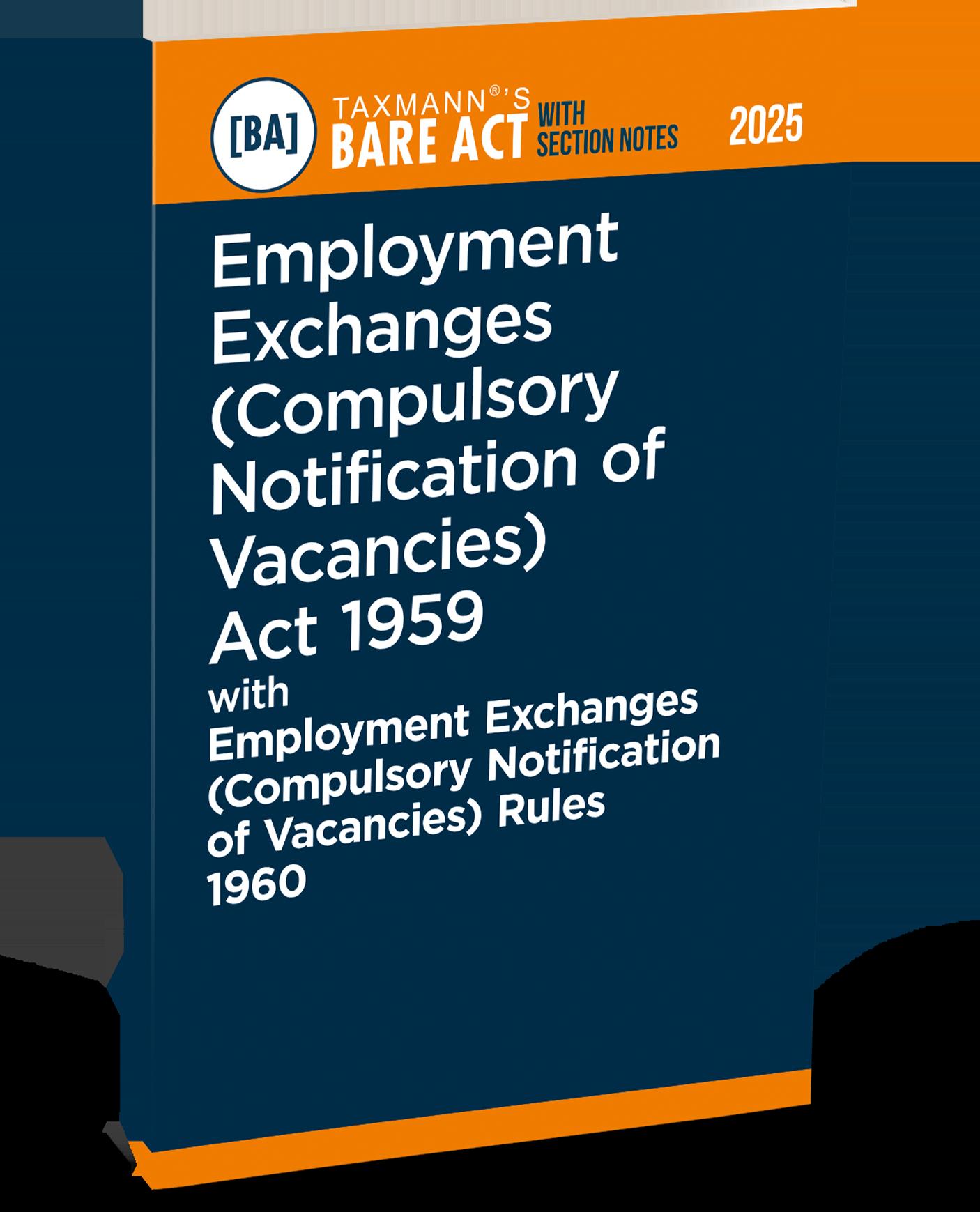© Taxmann Price : ` 85
Published by :
Taxmann Publications (P.) Ltd.
Sales & Marketing : 59/32, New Rohtak Road, New Delhi-110 005 India
Phone : +91-11-45562222
Website : www.taxmann.com
E-mail : sales@taxmann.com
Regd. Office : 21/35, West Punjabi Bagh, New Delhi-110 026 India
Printed at :
Tan Prints (India) Pvt. Ltd.
44 Km. Mile Stone, National Highway, Rohtak Road Village Rohad, Distt. Jhajjar (Haryana) India
E-mail : sales@tanprints.com
Disclaimer
Every effort has been made to avoid errors or omissions in this publication. In spite of this, errors may creep in. Any mistake, error or discrepancy noted may be brought to our notice which shall be taken care of in the next edition. It is notified that neither the publisher nor the author or seller will be responsible for any damage or loss of action to any one, of any kind, in any manner, therefrom. It is suggested that to avoid any doubt the reader should cross-check all the facts, law and contents of the publication with original Government publication or notifications.
No part of this book may be reproduced or copied in any form or by any means [graphic, electronic or mechanical, including photocopying, recording, taping, or information retrieval systems] or reproduced on any disc, tape, perforated media or other information storage device, etc., without the written permission of the publishers. Breach of this condition is liable for legal action.
For binding mistake, misprints or for missing pages, etc., the publisher’s liability is limited to replacement within seven days of purchase by similar edition. All expenses in this connection are to be borne by the purchaser. All disputes are subject to Delhi jurisdiction only.
4. Form and manner of notification of vacancies 16
5. Time limit for the notification of vacancies 19
6. Submission of returns 19
7. Officer for purposes of section 6 19
8. Prosecution under the Act 19
FORM ER I: Quarterly return submitted to the Local Employment Exchange for the quarter 20
FORM ER II: Occupational return to be submitted to the Local Employment Exchange once in two years 21
Employment Exchanges (Compulsory Notification of Vacancies) Act, 1959*
[31 OF 1959]1
An Act to provide for the compulsory notification of vacancies to employment exchanges.
BE it enacted by Parliament in the Tenth Year of the Republic of India as follows:—
Short title, extent and commencement
1. (1) This Act may be called the Employment Exchanges (Compulsory Notification of Vacancies) Act, 1959.
(2) It extends to the whole of India 2[***].
(3) It shall come into force in a State on such date3 as the Central Government may, by notification in the Official Gazette, appoint in this behalf for such State and different dates may be appointed for different States or for different areas of a State.
Definitions
2. In this Act, unless the context otherwise requires,—
(a) “appropriate Government” means—
(1) in relation to—
(a) any establishment of any railway, major port, mine or oilfield, or
(b) any establishment owned, controlled or managed by—
(i) the Central Government or a department of the Central Government,
* Shall be repealed by the Code on Social Security, 2020, with effect from a date yet to be notified.
1. Dated 2-9-1959.
2. Words “except the State of Jammu and Kashmir” omitted by the Central Labour Laws (Extension to Jammu and Kashmir) Act, 1970, w.e.f. 1-9-1971.
3. With effect from, 1-5-1960, vide Notification No. G.S.R. 382, dated 1-4-1960, in respect of all the States to which the Act extends and in the Union territories of Delhi, Himachal Pradesh, Manipur and Tripura w.e.f. 1-5-1960. In Andaman and Nicobar Islands and Lakshadweep (U.T.) it became enforceable w.e.f. 1-7-1978 vide G.S.R. 803, dated 17-5-1978 and in Sikkim, w.e.f. 5-8-2005 vide S.O. 1103(E), dated 5-8-2005, subject to certain conditions.
(ii) a company in which not less than fty-one per cent of the share capital is held by the Central Government or partly by the Central Government and partly by one or more State Governments,
(iii) a corporation (including a co-operative society) established by or under a Central Act which is owned, controlled or managed by the Central Government, the Central Government;
(2) in relation to any other establishment, the Government of the State in which that other establishment is situate;
(b) “employee” means any person who is employed in an establishment to do any work for remuneration;
(
(
(
(
c) “employer” means any person who employs one or more other persons to do any work in an establishment for remuneration and includes any person entrusted with the supervision and control of employees in such establishment;
d) “employment exchange” means any office or place established and maintained by the Government for the collection and furnishing of information, either by the keeping of registers or otherwise, respecting—
(i) persons who seek to engage employees;
(ii) persons who seek employment; and
(iii) vacancies to which persons seeking employment may be appointed;
(e) “establishment” means—
(a) any office, or
(b) any place where any industry, trade, business or occupation is carried on;
f) “establishment in public sector” means an establishment owned, controlled or managed by—
(1) the Government or a department of the Government;
(2) a Government company as defined in section 617 of the Companies Act, 1956 (1 of 1956);
(3) a corporation (including a co-operative society) established by or under a Central, provincial or State Act, which is owned, controlled or managed by the Government;
(4) a local authority;
g) “establishment in private sector” means an establishment which is not an establishment in public sector and where ordinarily twenty-five or more persons are employed to work for remuneration;
(h) “prescribed” means prescribed by rules made under this Act;
(i) “unskilled office work” means work done in an establishment by any of the following categories of employees, namely:— S. 2
3 EMPLOYMENT EXCHANGES ACT, 1959 S. 2
(1) daftri;
(2) jemadar, orderly and peon;
(3) dusting man or farash;
(4) bundel or record lifter;
(5) process server;
(6) watchman;
(7) sweeper;
(8) any other employees doing any routine or unskilled work which the Central Government may, by notification in the Official Gazette, declare to be unskilled office work.
COMMENTS
SECTION NOTES
2.1 Definition of “Employer” [Section 2(c)]
An “employer” refers to:
Any person who employs one or more individuals to perform work in an establishment for remuneration.
The definition also includes any person who is:
Entrusted with the supervision and control of employees within such establishment.
2.2 Definition of “Employment Exchange” [Section 2(d)]
An “employment exchange” means:
Any office or place that is established and maintained by the Government for the collection and furnishing of information, which may be done:
Through the keeping of registers, or
Any other method.
2.2-1 Scope of information handled
The information furnished or collected by an employment exchange pertains to:
Persons who seek to engage employees (i.e., employers or recruiters).
Persons who seek employment (i.e., job seekers).
Vacancies available for appointment of job seekers.
2.3 Definition of “Establishment in Public Sector” [Section 2(f)]
An “establishment in the public sector” refers to any establishment that is: Owned, controlled, or managed by the Government, either directly or through designated entities.
2.3-1 Entities constituting the Public Sector
The Government itself or a department of the Government.
A Government company as defined under section 617 of the Companies Act, 1956.
A corporation, including a co-operative society, that is:
Established by or under a Central, Provincial, or State Act, and Owned, controlled, or managed by the Government. A local authority (e.g., municipal corporation, panchayat).
2.4 Definition of “Unskilled Office Work” [Section 2(i)] “Unskilled office work” refers to the type of work performed in an establishment by certain categories of employees that involve routine or non-technical tasks, generally not requiring formal education or specialized training.
Categories of Employees Covered:
Daftri
Jemadar, Orderly, and Peon
Dusting man or Farash
Bundel or Record lifter
Process server
Watchman
Sweeper
Other similar employees performing routine or unskilled duties, as may be: Notified by the Central Government in the Official Gazette.
CASE LAWS
Definition of ‘Establishment’ - Inclusion of Non-Profit Entities - In this case, the Madras High Court considered whether a non-profit entity, the Cosmopolitan Club, could be deemed an “establishment” under the Employment Exchanges (Compulsory Notification of Vacancies) Act, 1959. The Court held that the presence or absence of a profit motive was immaterial for construing the definition. It ruled that “business” or “occupation” in section 2(e) is not restricted to commercial ventures with profit motives but includes any organized activity, even in non-commercial setups, aligning with the Act’s objective of facilitating comprehensive employment statistics collection. Thus, the Cosmopolitan Club was held to be an establishment within the meaning of the Act and was obliged to notify vacancies to the employment exchange. — The Cosmopolitan Club, Madras v. The District Employment Officer, Madras 1975 LAB IC 225 (Mad).
Act not to apply in relation to certain vacancies
3. (1) This Act shall not apply in relation to vacancies—
(a) in any employment in agriculture (including horticulture) in any establishment in private sector other than employment as agricultural or farm machinery operatives;
(b) in any employment in domestic service;
(c) in any employment the total duration of which is less than three months;
(d) in any employment to do unskilled office work;
(e) in any employment connected with the staff of Parliament.
(2) Unless the Central Government otherwise directs by notification in the Official Gazette in this behalf, this Act shall not also apply in relation to—
(a) vacancies which are proposed to be filled through promotion or by absorption of surplus staff of any branch or department of the same establishment or on the result of any examination conducted or interview
EMPLOYMENT EXCHANGES (COMPULSORY NOTIFICATION OF VACANCIES) ACT 1959 WITH
EMPLOYMENT EXCHANGES
(COMPULSORY NOTIFICATION OF VACANCIES)
RULES 1960 – BARE ACT WITH SECTION NOTES
AUTHOR : TAXMANN'S EDITORIAL BOARD
PUBLISHER : TAXMANN
DATE OF PUBLICATION : JUNE 2025
EDITION : 2025 EDITION
ISBN NO : 9789364550291
NO. OF PAGES : 28
BINDING TYPE : PAPERBACK
DESCRIPTION
Employment Exchanges (Compulsory Notification of Vacancies) Act 1959 with Employment Exchanges (Compulsory Notification of Vacancies) Rules 1960 [Bare Act with Section Notes] by Taxmann is a comprehensive legal publication offering the full text of the Act and Rules. Enhanced with clear, concise Section Notes, it illustrates legislative intent, key interpretations, and practical applications through case law, serving as a single reference point for complying with compulsory vacancy notifications in public and private sectors. This book is intended for the following audience:
� Legal Practitioners & Advocates
� Government Departments & Public Sector Units
� Private Sector Establishments & HR Managers
� Scholars & Students of Law
� Libraries & Institutions
The Present Publication is the 2025 Edition, covering the amended and updated text of the Employment ECNR Act [Act No. 31 of 1959] and Rules, with the following noteworthy features:
• [Complete Bare Act Text] Straightforward, unabridged presentation of the Act and Rules
• [Section Notes] Concise commentary highlighting scope and legislative intent, backed by judicial rulings
• [Cross-referencing] Links sub-rules, forms, and case law for holistic understanding
• [Updated 2025 Edition] Reflects recent legislative changes and clarifications
• [Pre-amendment Provisions] Includes earlier provisions in footnotes for historical context
• [Easy Navigation] Subject index and table of contents for quick reference
• [Forms & Returns] Complete text of Form ER I and Form ER II, detailing compliance processes
• [Emphasis on Compliance] Clear guidance on timelines and procedures to avoid statutory penalties
• [User-friendly Format] Ideal for quick reference in legal, HR, or administrative settings





